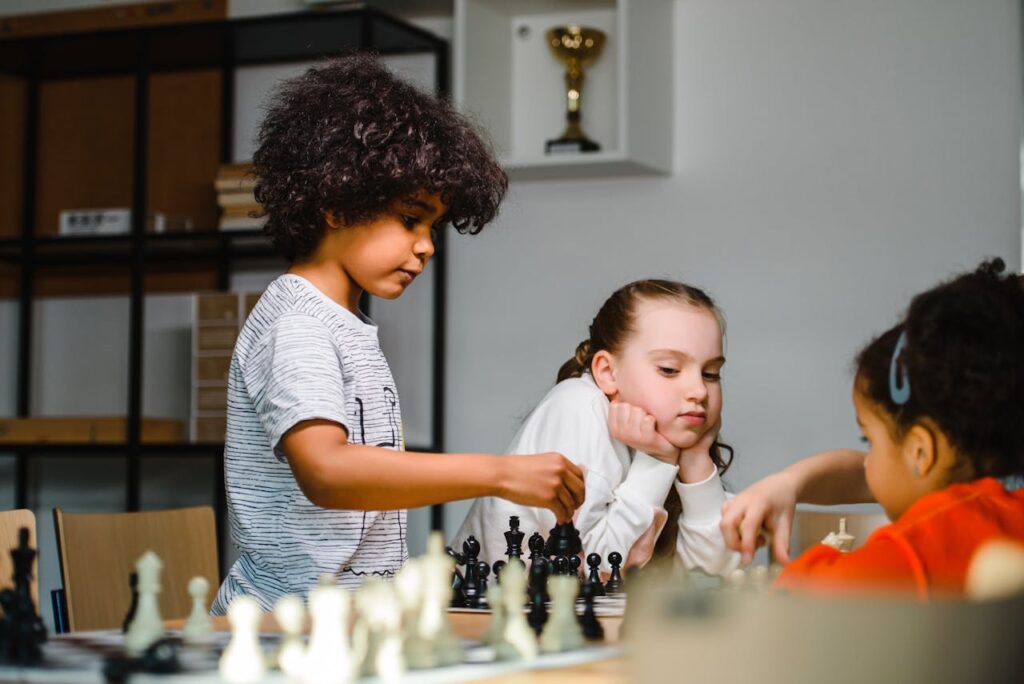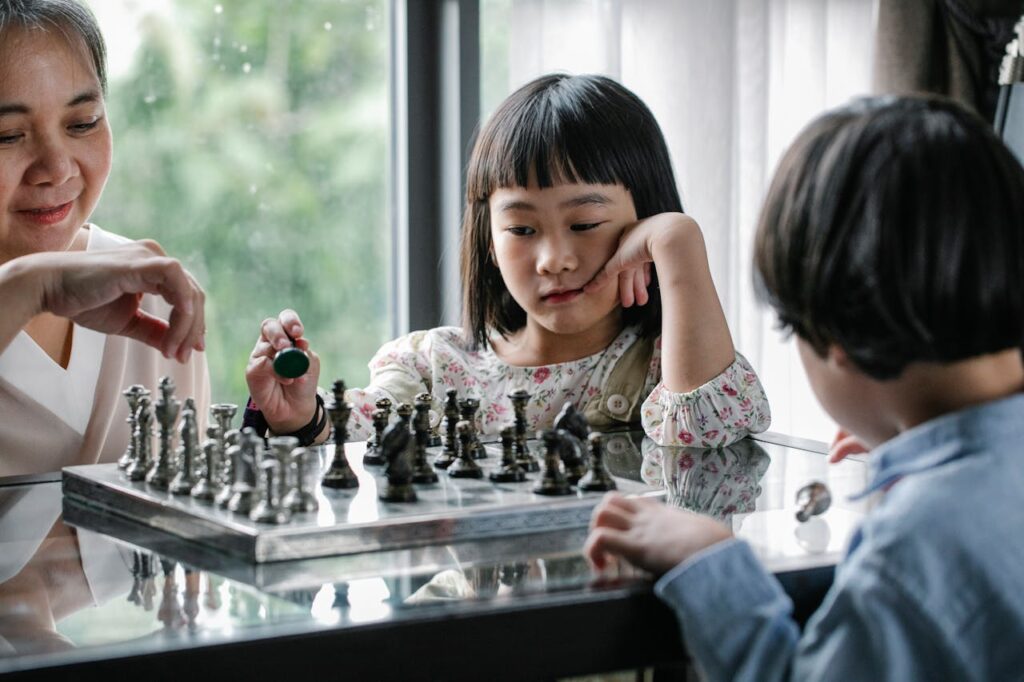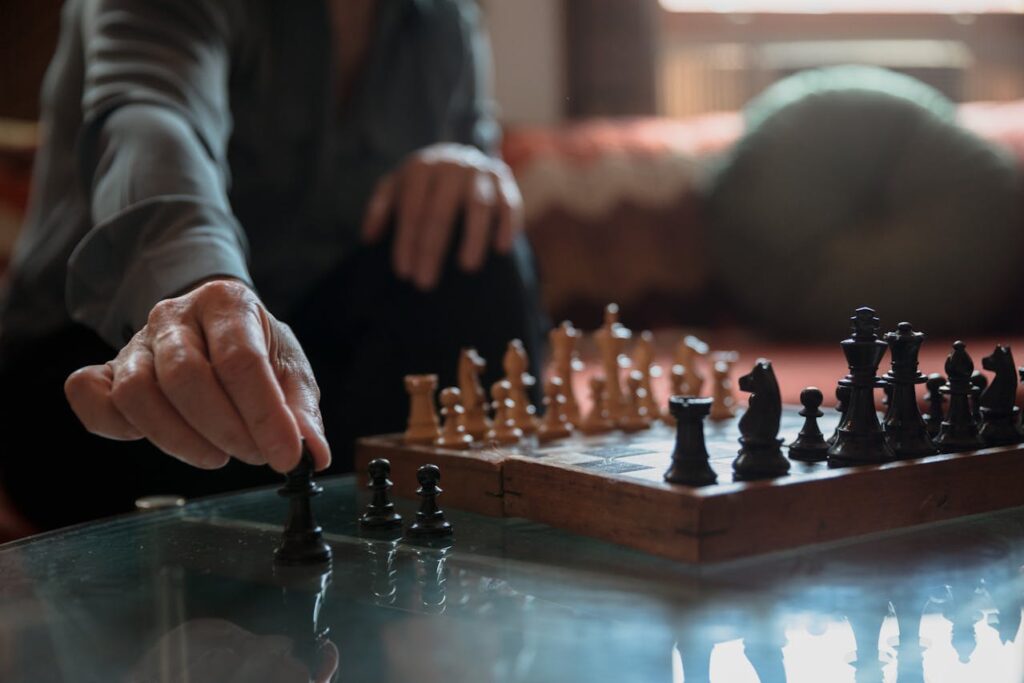In today’s fast-paced world, where technology often dictates the way we learn and interact, finding activities that foster a love of learning can be challenging. Chess, however, has stood the test of time as a game that not only entertains but also educates in profound ways.
It is more than just a game; it’s a tool that helps children develop critical thinking, patience, and a desire to learn continuously. By engaging with chess, children begin a journey of lifelong learning that extends far beyond the chessboard.
Nurturing Curiosity Through Chess
Curiosity is the driving force behind lifelong learning. It’s the desire to explore, ask questions, and seek out new knowledge.
Chess naturally nurtures this curiosity in children by presenting them with endless possibilities and challenges to solve.
Encouraging Exploration of Ideas
One of the most exciting aspects of chess is that it encourages children to explore different strategies and ideas. There isn’t just one way to play chess; every player brings their own style to the game.
As children learn to play, they experiment with various openings, tactics, and endgame strategies.
This exploration allows them to discover what works best for them and teaches them that learning is an ongoing process.
For example, a child might start by learning basic opening principles, like controlling the center of the board with pawns.

As they become more confident, they might explore different openings, such as the King’s Gambit or the Sicilian Defense, to see how they work in practice.
This experimentation helps them understand that there are multiple ways to approach a problem, encouraging them to keep asking questions and seeking new solutions.
Fostering a Love for Learning
Chess is a game that rewards effort and improvement. Unlike some activities where progress can be slow or difficult to measure, chess provides immediate feedback.
Each game offers a new opportunity to learn something, whether it’s a tactical idea, a strategic principle, or a better understanding of an opponent’s mindset.
This immediate feedback loop helps children see the value of learning and motivates them to continue improving.
For example, after losing a game, a child might reflect on their moves and identify where they went wrong.
They might realize that they overlooked a key threat or missed a tactical opportunity.
This realization encourages them to learn from their mistakes and apply that knowledge in future games. Over time, this process of learning and applying new knowledge fosters a deep love for learning.
Promoting Independent Thinking
Chess is a game of individual decision-making. Every move requires a player to analyze the situation, consider their options, and make a choice based on their own reasoning.
This practice of independent thinking is essential for lifelong learning, as it teaches children to trust their judgment and think critically about the information they encounter.
For instance, during a game, a child might face a position where they have to choose between attacking their opponent’s king or reinforcing their own defense.
This decision requires them to weigh the pros and cons of each option and make a move based on their analysis.
This process of independent decision-making strengthens their ability to think critically and trust their instincts.
Inspiring Creative Problem-Solving
Chess is often referred to as a game of infinite possibilities because of the countless ways a game can unfold.
This aspect of chess inspires children to think creatively and develop innovative solutions to the problems they encounter on the board.
Creative problem-solving is a key component of lifelong learning, as it encourages children to approach challenges with an open mind and a willingness to experiment.

For example, a child might find themselves in a difficult position, with their pieces seemingly trapped.
Instead of giving up, they might think outside the box and come up with an unexpected move that turns the game in their favor.
This creative approach to problem-solving teaches them that there is often more than one solution to a problem and that thinking creatively can lead to breakthroughs.
Building Resilience Through Chess
Resilience is the ability to bounce back from setbacks, learn from mistakes, and keep pushing forward despite challenges.
It’s a crucial trait for lifelong learning, as the path to mastery in any field is rarely smooth.
Learning from Mistakes
In chess, mistakes are a natural part of the game. Even the best players make errors, but what sets them apart is their ability to learn from those mistakes.
When children play chess, they quickly realize that every loss is an opportunity to learn.
By analyzing their games, identifying where they went wrong, and understanding how to avoid similar mistakes in the future, they build resilience and improve their skills.
For example, after losing a game, a child might review the moves with a coach or a parent to pinpoint the moment where their strategy faltered.
They might discover that they were too aggressive or failed to notice a key threat.
This process of reflection and learning helps them understand that mistakes are not failures but stepping stones to improvement.
Embracing Challenges
Chess is a game of constant challenges. Every opponent presents a new puzzle to solve, and every game is an opportunity to test one’s skills.
By embracing these challenges, children learn to see difficulty as an opportunity for growth rather than something to be avoided.
This perspective is key to lifelong learning, as it encourages a positive attitude toward challenges and a determination to overcome them.
For instance, as children progress in chess, they will inevitably face stronger opponents.
These tougher matches might initially seem daunting, but they also provide the best opportunities for growth.
A child who embraces the challenge of playing against a stronger player is more likely to learn new strategies, improve their skills, and build confidence in their abilities.
Developing Patience and Perseverance
Resilience is closely tied to the qualities of patience and perseverance. Chess, being a game of strategy and foresight, requires players to be patient and think several moves ahead.
Success doesn’t come quickly; it’s the result of careful planning, thoughtful execution, and the perseverance to stick with a strategy even when the outcome isn’t immediately clear.
By developing these qualities through chess, children learn to approach learning as a long-term process that requires dedication and persistence.
For example, a child might spend weeks or even months learning a particular opening strategy.
At first, their efforts might not seem to pay off, and they may lose several games while trying to master the technique.
Handling Success and Failure Gracefully
Chess also teaches children how to handle both success and failure with grace.
Winning a chess game can be incredibly rewarding, but it’s important for children to learn that success should not lead to overconfidence or complacency.

Likewise, losing a game can be disappointing, but it should not lead to discouragement or giving up.
By learning to handle both outcomes with humility and a focus on continuous improvement, children develop a balanced approach to success and failure that is crucial for lifelong learning.
For instance, after winning a game, a child might review the match to see what they did well and what they could improve.
Fostering a Growth Mindset Through Chess
A growth mindset is the belief that abilities and intelligence can be developed through dedication and hard work.
This mindset is the foundation for lifelong learning, as it encourages individuals to embrace challenges, persist in the face of setbacks, and view effort as the path to mastery.
Understanding the Power of Effort
Chess is a game that rewards effort. The more time and energy children invest in learning and practicing, the better they become.
Unlike activities where natural talent might play a more significant role, chess offers a clear connection between the effort put in and the improvement achieved.
This relationship helps children understand that hard work and persistence are the keys to success.
For example, a child who spends time studying different opening strategies and practicing them in games will likely see noticeable improvement in their performance.
They’ll learn that it’s not just about winning a single game but about gradually building their skills through consistent effort.
This understanding reinforces the idea that effort leads to growth, a core principle of the growth mindset.
Embracing Learning Over Winning
One of the most important aspects of a growth mindset is the focus on learning rather than just winning. In chess, as in life, there will always be someone better, and losses are inevitable.
What matters is not the loss itself but what can be learned from it. Chess teaches children to value the process of learning, even when it comes from making mistakes or facing defeat.
In a broader context, this focus on learning over winning helps children approach challenges with a positive attitude.
Whether it’s trying out for a sports team, participating in a science fair, or tackling a tough school project, they’ll be more likely to take risks, embrace challenges, and learn from their experiences.
Chess fosters this mindset by providing a structured environment where the emphasis is on continuous improvement rather than just on the final outcome.
Developing Resilience Through Perseverance
A growth mindset is closely linked to resilience, as it encourages children to persevere in the face of setbacks.
In chess, players often find themselves in difficult positions where success seems unlikely.
However, those with a growth mindset understand that perseverance can lead to unexpected opportunities, even in the toughest situations.
They learn to keep pushing forward, even when the odds are against them, because they know that every challenge is an opportunity to learn.

For instance, a child might be down several pieces in a game, with their opponent seemingly in control.
Rather than giving up, they might continue to play strategically, looking for any opportunity to turn the game around.
Encouraging Self-Reflection and Growth
Self-reflection is a key component of a growth mindset, as it allows individuals to assess their progress, identify areas for improvement, and set goals for future growth.
Chess naturally encourages this kind of self-reflection, as players are constantly evaluating their performance, analyzing their mistakes, and thinking about how they can improve.
For example, after a chess match, a child might spend time reviewing the game, either on their own or with a coach.
They might look at critical moments where the game could have gone differently and think about what they could have done better.
This process of self-reflection helps them understand their strengths and weaknesses, set goals for future improvement, and stay motivated to keep learning.
How Chess Cultivates Lifelong Intellectual Curiosity
Intellectual curiosity—the desire to learn, explore, and understand the world—is the cornerstone of lifelong learning.
Chess is a game that naturally stimulates this curiosity, encouraging children to constantly ask questions, explore new ideas, and seek out knowledge.
Stimulating Inquisitiveness and Exploration
Chess is a game rich with possibilities. Every move opens up new opportunities and poses new challenges, prompting players to think deeply and explore different strategies.
This constant stimulation of the mind encourages children to be inquisitive, to ask “What if?” and to explore the many facets of the game.
For instance, a child might become curious about why certain openings are more effective than others.
This curiosity could lead them to explore different opening theories, study famous games, or experiment with their strategies.
Through this process, they learn that asking questions and seeking answers is a rewarding way to deepen their understanding.
Encouraging a Lifelong Love of Learning
Chess is often described as a game that can be learned in a day but takes a lifetime to master.
This aspect of chess—that there is always room for improvement, always more to learn—encourages a lifelong love of learning.
Children who play chess regularly come to appreciate the joy of discovery and the satisfaction that comes from mastering new skills over time.
For example, as a child advances in chess, they might begin to explore advanced concepts like positional play, endgame theory, or psychological strategies.
Each of these areas offers a new challenge and a new opportunity to learn, keeping the game fresh and engaging.
This ongoing learning process teaches children that the pursuit of knowledge is a rewarding journey that doesn’t have an endpoint.
Integrating Knowledge from Other Fields
One of the unique aspects of chess is its ability to integrate knowledge from a variety of disciplines.
Understanding chess requires a blend of logical reasoning, mathematical thinking, strategic planning, and even psychological insight.
As children learn to play chess, they naturally draw on these different areas of knowledge, reinforcing what they’ve learned in other contexts and seeing how it all connects.

For instance, a child might use their understanding of probability when deciding whether to take a risky move, or they might apply concepts from geometry to understand the control of space on the board.
This interdisciplinary approach to learning not only deepens their understanding of chess but also enhances their overall intellectual development.
Inspiring Research and Continuous Learning
As children become more invested in chess, they often find themselves wanting to learn more about the game’s history, famous players, and different strategies.
This desire to dig deeper and learn more fosters a habit of research and continuous learning, which is essential for lifelong intellectual growth.
For example, a child might read about the games of famous grandmasters like Garry Kasparov or Bobby Fischer, watch instructional videos, or study advanced chess literature to improve their skills.
This habit of seeking out information and learning independently is a powerful tool that extends beyond chess.
It teaches children how to conduct research, evaluate sources, and apply what they’ve learned to improve their performance.
This habit of continuous learning is vital for success in a world where knowledge is constantly evolving.
Whether in academics, professional life, or personal development, the ability to keep learning and growing is a key factor in achieving long-term success.
Chess encourages this habit by providing a structured yet endlessly deep field of study that rewards those who take the time to learn and improve.
Conclusion
Chess is much more than a game; it’s a powerful educational tool that lays the foundation for lifelong learning.
By nurturing curiosity, building resilience, fostering a growth mindset, and encouraging intellectual curiosity, chess helps children develop the skills and attitudes necessary to succeed in all areas of life.
The lessons learned on the chessboard—whether it’s the importance of effort, the value of learning from mistakes, or the joy of discovering new ideas—translate directly into academic success, personal growth, and professional achievement.
At the Global School of Chess, we are committed to helping children harness the full potential of chess to become lifelong learners.
Our programs are designed to support children at every stage of their chess journey, providing them with the tools, guidance, and encouragement they need to thrive both on and off the chessboard.
READ NEXT:
- Why Chess Should Be Part of Every Adult’s Mental Fitness Routine
- The Cognitive Edge: How Chess Enhances Adult Brainpower
- How Chess Builds Mental Toughness in Adults
- Why Chess is the Perfect Game for Boosting Creativity in Adults
- Cognitive Enhancement Through Chess: A Guide for Mature Learners
- How Chess Improves Critical Thinking Skills in Grown-Ups
- Why Chess Should Be a Daily Habit for Kids

